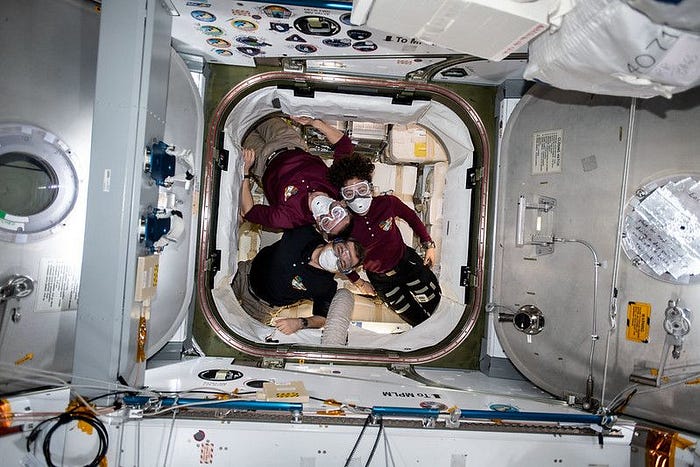Exploring Disease Management in Future Space Colonies
Written on
Understanding Disease Risks in Space Colonization
As humanity sets its sights on colonizing the solar system, the threat of disease becomes an inevitable concern. With space colonists living in confined quarters, the likelihood of epidemics spreading through these communities is significant. So, what strategies can we employ to manage health risks in space?
Amid the ongoing efforts to combat COVID-19 on Earth, social distancing has become a common practice to curb disease transmission. However, living conditions on space stations, and in future lunar and Martian habitats, will be quite cramped. Historically, astronauts have faced health challenges during their missions. As we venture further into space, how can we effectively address potential outbreaks?
From the early days of space exploration, astronauts have encountered various health issues. Initial missions often had only one occupant, but as technology advanced, crew sizes increased to four, five, or even seven members in current flights, with the International Space Station (ISS) typically hosting six crew members. Future colonies on the Moon or Mars could accommodate hundreds or even thousands of inhabitants.

The Impact of Space on Human Health
Living in a microgravity environment alters human physiology and health. NASA and other agencies are conducting research to understand how space affects the human body. Insights gained from these studies not only enhance the safety of astronauts but may also provide valuable information to safeguard public health on Earth.
"Factors such as radiation exposure, microgravity, psychological stress, and disrupted sleep patterns can all influence astronauts' immune responses," NASA officials report. "By understanding how these factors impact immunity, scientists can develop strategies to identify early signs of illness and suggest interventions that could enhance immune function and prevent severe infections."
How Space Affects Viruses and Immunity
Studies show that the human immune system behaves differently in space compared to Earth, leading to disruptions in immune responses.
"The complexities of the immune system require further investigation, especially during space missions. It is crucial to determine if these changes pose increased health risks for astronauts on long-duration missions to destinations like Mars," states Dr. Brian Crucian from NASA's Johnson Space Center.
For example, during the Apollo 7 mission in 1968, the crew members caught colds, which impacted their mission operations. This incident prompted NASA to implement quarantine protocols to minimize exposure to illness before missions.
Utilizing Technology for Health Management
Advancements in telemedicine have enabled astronauts to receive expert medical guidance from Earth. For instance, NASA successfully managed a case of deep vein thrombosis (DVT) in an astronaut aboard the ISS.
Dr. Stephan Moll, a blood clot specialist, provided remote assistance after the astronaut was diagnosed two months into a six-month mission. Despite the limited medical supplies available on the ISS, the astronaut received necessary treatment while following detailed instructions from Earth.
Challenges of Disease Transmission in Space
Microbial transmission poses a unique challenge in space. In the absence of gravity, airborne particles remain suspended, increasing the risk of disease spread among crew members. Proper ventilation and air filtration systems, including HEPA filters, are essential to mitigate these risks.
A study from 2012 reviewed health records of 742 astronauts and found 29 instances of disease transmission, including fungal infections and influenza.
Interestingly, the immune system may weaken in space, resulting in slower wound healing and reduced effectiveness of infection-fighting cells. Simultaneously, pathogens might evolve, becoming more resistant to treatment.
The psychological effects of long-duration missions also contribute to health concerns. Astronauts may experience sleep disturbances and stress, which can make them more susceptible to infections.
Maintaining Health in Isolated Environments
The ISS has implemented robust health monitoring protocols, including regular assessments of viruses and bacteria among astronauts. Similar health management strategies will be crucial for future colonies on the Moon and Mars.
Infected crew members can be isolated, and the ISS is equipped with advanced air filtration systems to safeguard against biological threats. Quarantine measures upon returning to Earth have also been standard practice since the early days of human spaceflight.
Looking Ahead: Managing Epidemics in Space
As we push further into the cosmos, we must prepare for the possibility of disease outbreaks in space. The same public health strategies employed on Earth will likely play a significant role in protecting future space colonists.
While the challenges of managing health in space are daunting, advancements in science and technology will continue to aid our efforts. As we explore the solar system, we must also safeguard the health of those who venture beyond our planet.
James Maynard is the founder and publisher of The Cosmic Companion. He resides in Tucson with his wife, Nicole, and their cat, Max.
Exploring Innovations in Space Medicine
The first video, Igniting Innovation: Science in Space to Cure Disease on Earth, discusses how space research is driving medical advancements that could benefit health on our planet.
Addressing Health Challenges in Space Missions
The second video, How We Get Sick in Space and How to Recover | Compilation, explores the unique health issues astronauts face and the measures taken to ensure their well-being during missions.